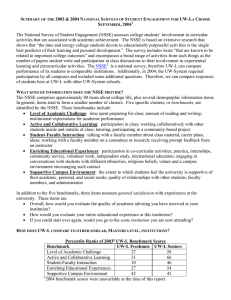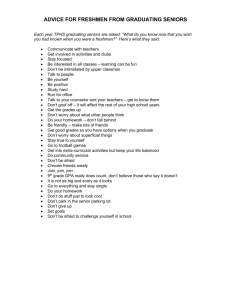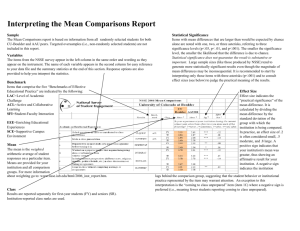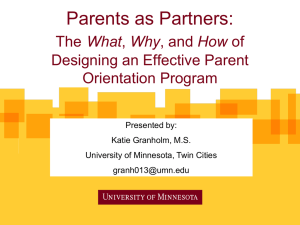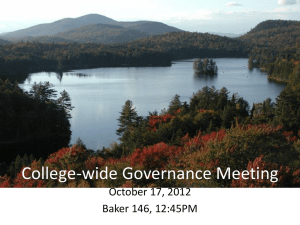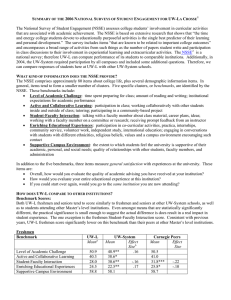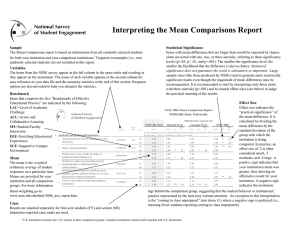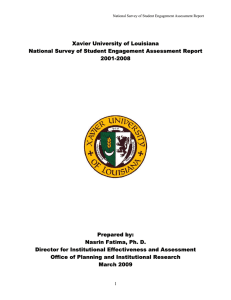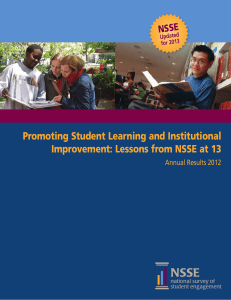Document 10600286
advertisement
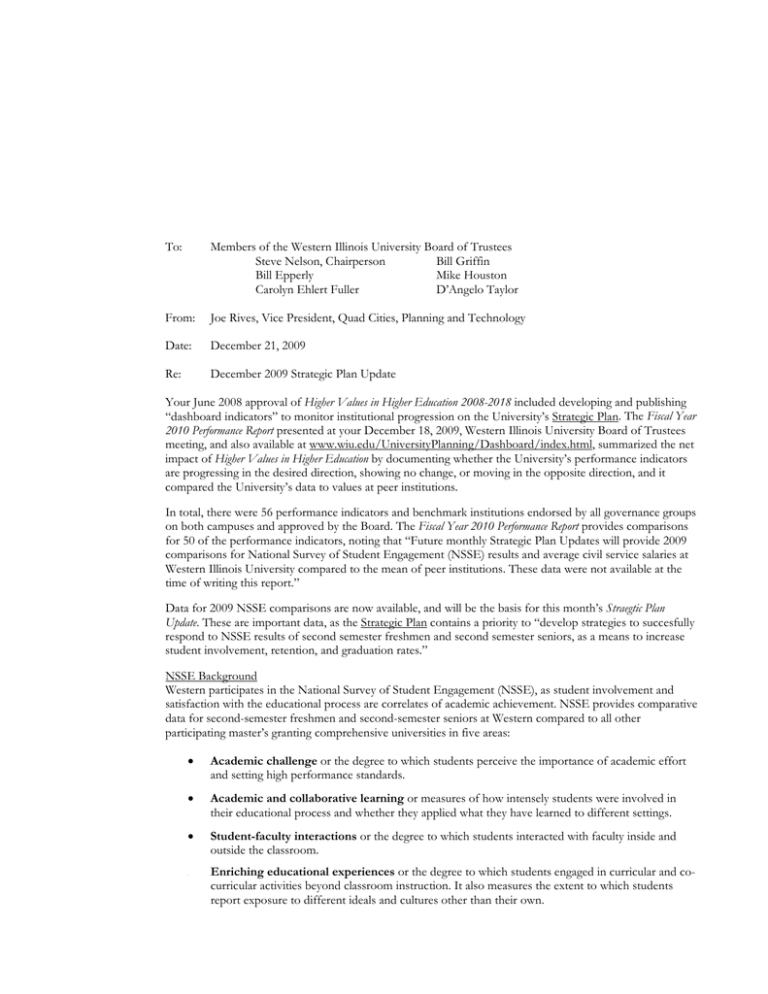
To: Members of the Western Illinois University Board of Trustees Steve Nelson, Chairperson Bill Griffin Bill Epperly Mike Houston Carolyn Ehlert Fuller D’Angelo Taylor From: Joe Rives, Vice President, Quad Cities, Planning and Technology Date: December 21, 2009 Re: December 2009 Strategic Plan Update Your June 2008 approval of Higher Values in Higher Education 2008-2018 included developing and publishing “dashboard indicators” to monitor institutional progression on the University’s Strategic Plan. The Fiscal Year 2010 Performance Report presented at your December 18, 2009, Western Illinois University Board of Trustees meeting, and also available at www.wiu.edu/UniversityPlanning/Dashboard/index.html, summarized the net impact of Higher Values in Higher Education by documenting whether the University’s performance indicators are progressing in the desired direction, showing no change, or moving in the opposite direction, and it compared the University’s data to values at peer institutions. In total, there were 56 performance indicators and benchmark institutions endorsed by all governance groups on both campuses and approved by the Board. The Fiscal Year 2010 Performance Report provides comparisons for 50 of the performance indicators, noting that “Future monthly Strategic Plan Updates will provide 2009 comparisons for National Survey of Student Engagement (NSSE) results and average civil service salaries at Western Illinois University compared to the mean of peer institutions. These data were not available at the time of writing this report.” Data for 2009 NSSE comparisons are now available, and will be the basis for this month’s Straegtic Plan Update. These are important data, as the Strategic Plan contains a priority to “develop strategies to succesfully respond to NSSE results of second semester freshmen and second semester seniors, as a means to increase student involvement, retention, and graduation rates.” NSSE Background Western participates in the National Survey of Student Engagement (NSSE), as student involvement and satisfaction with the educational process are correlates of academic achievement. NSSE provides comparative data for second-semester freshmen and second-semester seniors at Western compared to all other participating master’s granting comprehensive universities in five areas: • Academic challenge or the degree to which students perceive the importance of academic effort and setting high performance standards. • Academic and collaborative learning or measures of how intensely students were involved in their educational process and whether they applied what they have learned to different settings. • Student-faculty interactions or the degree to which students interacted with faculty inside and outside the classroom. • Enriching educational experiences or the degree to which students engaged in curricular and cocurricular activities beyond classroom instruction. It also measures the extent to which students report exposure to different ideals and cultures other than their own. December 2009 Strategic Plan Update December 21, 2009 Page 2 • Supportive campus environment or the extent to which students perceive that the University’s academic programs and co-curricular services are committed to student success inside and outside the classroom. NSSE Comparisons Values at or above 100 percent in the table below show that reported student satisfaction is higher at Western than peer institutions (all other Master’s Granting Comprehensive Institutions). The data show that: • In 2009, Western freshmen and seniors reported higher levels of engagement in student-faculty interactions than students at peer institutions. This includes discussing grades or assignments with an instructor, talking about career plans with a faculty member or advisor, and working with faculty members on activities other than coursework (committees, orientation, student life activities, etc.) Western freshmen and seniors also reported higher levels of engagement in a supportive campus environment than students at peer institutions. Western students rate the quality of relationships with students, faculty, and offices and the institutional environment promoting student academic and social success at levels higher than students at peer institutions. • Comparing 2008 to 2009, values for Western freshmen increased in four of the five areas. The level of academic challenge only decreased by one percent. Values for Western seniors improved in academic and collaborative learning, student-faculty interactions, and supportive campus environment. • Over the last five years, values for Western freshmen improved in all five areas. Values for Western seniors improved in academic and collaborative learning, student-faculty interactions, and supportive campus environment. National Survey of Student Engagement Results Western Illinois University Compared to the Mean of All Other Master’s Granting Comprehensive Institutions Survey Years 2005 through 2009 Second Semester Freshmen Level of Academic Challenge Academic and Collaborative Learning Student-Faculty Interactions Enriching Educational Experiences Supportive Campus Environment 2005 92% 85% 97% 85% 97% 2006 102% 99% 119% 99% 106% Second Semester Seniors Level of Academic Challenge Academic and Collaborative Learning Student-Faculty Interactions Enriching Educational Experiences Supportive Campus Environment 97% 94% 100% 86% 102% 98% 98% 107% 91% 106% Survey Year 2007 92% 90% 99% 91% 98% 96% 98% 106% 89% 104% 2008 94% 89% 100% 88% 102% 2009 93% 93% 106% 90% 104% 97% 94% 100% 87% 101% 96% 96% 104% 85% 104% The University Surveys Website (www.wiu.edu/surveys), maintained by Dr. Tere North contains additional NSSE data, and other local/national surveys administered by the University. Dr’s North survey support provides empirical data to inform decision-making and accountability reporting. Please contact me if you have any questions about the data presented in Strategic Plan Update, and/or if you have additional feedback for the continued successful implementation of Higher Values in Higher Education. cc: President Goldfarb Provost Thomas Vice President Johnson Vice President Thompson CSEC President Lavin COAP President Meixner Faculty Council Chair Rowson Faculty Senate Chair Devolder Macomb SGA Chair Heard Quad Cities SGA Garrison Alumni Council Chair Clawson Associate Provosts Dallinger and Hawkinson Assistant Vice President Williams Planning, Budget, and IR Staff President’s Office Support Staff
